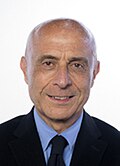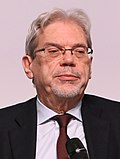Gentiloni Cabinet | |
|---|---|
| 64th Cabinet of Italy | |
 | |
| Date formed | 12 December 2016 |
| Date dissolved | 1 June 2018 (537 days) |
| People and organisations | |
| Head of state | Sergio Mattarella |
| Head of government | Paolo Gentiloni |
| No. of ministers | 19 (incl. Prime Minister) |
| Member parties | PD, AP, CpE |
| Status in legislature | Majority (coalition) |
| Opposition parties | M5S, FI, LN, SI, FdI, UdC, ALA (until Oct. 2017), MDP (since Oct. 2017) |
| History | |
| Outgoing election | 2018 election |
| Legislature term | XVII Legislature (2013–2018) |
| Predecessor | Renzi government |
| Successor | First Conte government |
| ||
|---|---|---|
Political officies Minister for Foreign Affairs Prime Minister of Italy European Commissioner | ||
The Gentiloni government was the 64th government of the Italian Republic, in office from 12 December 2016 to 1 June 2018. The government was headed by Paolo Gentiloni, former Minister of Foreign Affairs of the Renzi government. [1]
Contents
- History
- Background and formation
- Investiture votes
- Party breakdown
- Beginning of term
- End of term
- Geographical breakdown
- Beginning of term 2
- End of term 2
- Council of Ministers
- Composition
- References
- External links
The government was formed after Matteo Renzi's resignation as Prime Minister, due to the result of the 2016 constitutional referendum. The new government preserved most of the ministers of the former Renzi government. [2] It was led by the centre-left Democratic Party (PD), and it originally included the New Centre-Right (NCD) and the Centrists for Europe (CpE) as junior partners. It also included a few non-party independents. The NCD was later merged into Popular Alternative (AP).
























